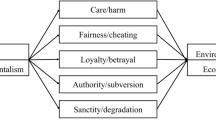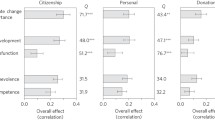Abstract
We examined whether differences in climate-friendly choices between the supporters of left-wing and right-wing ideologies are based on different moral foundations. Moreover, we compared general and issue-specific endorsement of moral foundations applied to climate change. Study 1 examined the endorsement of general moral foundations of university students living in Finland (N = 272). Individualizing foundations were associated with increased climate-friendly choices and binding foundations were associated with decreased climate-friendly choices; the endorsement of moral foundations made the effect of political orientation disappear. In Study 2 we developed and tested an issue-specific measure of moral foundations (N = 350). The issue-specific endorsement of both types of foundations was directly associated with increased climate-friendly consumption. Binding foundations were associated with the avoidance of climate-friendly choices through right-wing orientation. These findings increase our understanding of differences between general and issue-specific moral concerns and their association to political orientation and pro-environmental behavior.




Similar content being viewed by others
Notes
The current version of the Moral Foundations Questionnaire measures five foundations. http://www.moralfoundations.org/questionnaires.
In Study 1, MFQ was not adjusted to the climate change context. The goal of the translation was to be faithful to the original MFQ and, at the same time, be meaningful in the Finnish context.
References
Adger, W. N., Dessai, S., Goulden, M., Hulme, M., Lorenzoni, I., Nelson, D. R., et al. (2009). Are there social limits to adaptation to climate change? Climatic Change, 93, 335–354.
Ajzen, I. (1991). The theory of planned behavior. Organizational Behavior and Human Decision Processes, 50, 179–211.
Arbuckle, J. L. (2011). IBM ® SPSS ® Amos™ 21 user’s guide. Spring House, PA: AMOS Development Corporation.
Arnett, J. J., Ramos, K., & Jensen, L. A. (2001). Ideological views in emerging adulthood: Balancing autonomy and community. Journal of Adult Development, 8, 69–79.
Bamberg, S. (2003). How does environmental concern influence specific environmentally related behaviors? A new answer to an old question. Journal of Environmental Psychology, 23, 21–32.
Bamberg, S., & Möser, G. (2007). Twenty years after Hines, Hungerford, and Tomera: A new meta-analysis of psychosocial determinants of pro-environmental behavior. Journal of Environmental Psychology, 27, 14–25.
Bentler, P. M. (1990). Comparative fit indexes in structural models. Psychological Bulletin, 107, 238–246.
Blok, V., Wesselink, R., Studynka, O., & Kemp, R. (2015). Encouraging sustainability in the workplace: A survey on the pro-environmental behaviour of university employees. Journal of Cleaner Production, 106, 55–67.
Browne, M. W., & Cudeck, R. (1993). Alternative ways of assessing model fit. In K. A. Bollen & S. J. Long (Eds.), Testing structural equation models (pp. 136–162). California: Sage.
Carmines, E. G., & McIver, J. P. (1981). Analyzing models with unobserved variables. In G. W. Bohrnstedt & E. Borgatta (Eds.), Social measurement: Current issues (pp. 65–115). Beverly Hills: Sage.
Chung, J., & Monroe, G. S. (2003). Exploring social desirability bias. Journal of Business Ethics, 44, 291–302.
Clark, L. A., & Watson, D. (1995). Constructing validity: Basic issues in objective scale development. Psychological Assessment, 7, 309–319.
Corraliza, J. A., & Berenguer, J. (2000). Environmental values, beliefs, and actions: A situational approach. Environment and Behavior, 32, 832–848.
Emler, N. (1999). Moral character. In V. Derlaga, B. Winstead, & W. Jones (Eds.), Personality: Contemporary theory and research (2nd ed., pp. 376–404). Chicago: Nelson.
European Commission (2011). Climate change report. Special eurobarometer, 372. Retrieved from http://ec.europa.eu/public_opinion/archives/ebs/ebs_372_en.pdf.
Feinberg, M., & Willer, R. (2013). The moral roots of environmental attitudes. Psychological Science, 24, 56–62.
Feygina, I., Jost, J. T., & Goldsmith, R. E. (2010). System justification, the denial of global warming, and the prospect of “system-sanctioned” change. Personality and Social Psychology Bulletin, 36, 326–338.
Flere, S., & Lavrič, M. (2008). On the validity of cross-cultural social studies using student samples. Field Methods, 20, 399–412.
Graham, J., Haidt, J., Koleva, S., Motyl, M., Iyer, R., Wojcik, S., & Ditto, P. H. (2012). Moral foundations theory: The pragmatic validity of moral pluralism. Advances in Experimental Social Psychology, 47, 55–130.
Graham, J., Haidt, J., & Nosek, B. A. (2009). Liberals and conservatives rely on different sets of moral foundations. Journal of Personality and Social Psychology, 96, 1029–1046.
Graham, J., Nosek, B. A., Haidt, J., Iyer, R., Koleva, S., & Ditto, P. H. (2011). Mapping the moral domain. Journal of Personality and Social Psychology, 101, 366–385.
Haidt, J. (2010). How to translate the MFQ. Retrieved from http://www.yourmorals.org/blog/2010/01/how-to-translate-the-mfq/.
Haidt, J., & Graham, J. (2007). When morality opposes justice: Conservatives have moral intuitions that liberals may not recognize. Social Justice Research, 20, 98–116.
Hunter, J. D. (1991). Culture wars. The struggle to define America. New York: Basic Books.
IPCC (the Intergovernmental Panel on Climate Change). (2014). Climate change 2014: Synthesis report. Geneva: IPCC.
Iyer, R., Koleva, S., Graham, J., Ditto, P., & Haidt, J. (2012). Understanding libertarian morality: The psychological dispositions of self-identified libertarians. PLoS One, 7, e42366.
Jamieson, D. (2009). Climate change, responsibility, and justice. Science and Engireening Ethics, 16, 431–445.
Johnson, K. M., Iyer, R., Wojcik, S. P., Vaisey, S., Miles, A., Chu, V., & Graham, J. (2014). Ideology-specific patterns of moral indifference predict intentions not to vote. Analyses of Social Issues and Public Policy, 14, 61–77.
Jones, T. M. (1991). Ethical decision making by individuals in organizations: An issue-contingent model. The Academy of Management Review, 16, 366–395.
Jones, M. D., & Song, G. (2014). Making sense of climate change: How story frames shape cognition. Political Psychology, 35, 447–476.
Jöreskog, K. G., & Sörbom, D. (1984). Lisrel VI. Analysis of linear structural relationships by maximum likelihood, instrumental variables, and least squares methods. Mooresville: Scientific Software.
Jost, J. T., Glaser, J., Kruglanski, A. W., & Sulloway, F. J. (2003). Exceptions that prove the rule—using a theory of motivated social cognition to account for ideological incongruities and political anomalies: Reply to Greenberg and Jonas (2003). Psychological Bulletin, 129, 383–393.
Juujärvi, S. (2005). Care and justice in real-life moral reasoning. Journal of Adult Development, 12, 199–210.
Kenny, D. A. (2015). Measuring model fit. Retrieved from http://davidakenny.net/cm/fit.htm.
Koleva, S. P., Graham, J., Iyer, R., Ditto, P. H., & Haidt, J. (2012). Tracing the threads: How five moral concerns (especially Purity) help explain culture war attitudes. Journal of Research in Personality, 46, 184–194.
Kugler, M., Jost, J. T., & Noorbaloochi, S. (2014). Another look at moral foundations theory: Do authoritarianism and social dominance orientation explain liberal-conservative differences in “moral” intuitions? Social Justice Research, 27, 413–431.
Kvaløy, B., Finseraas, H., & Listhaug, O. (2012). The publics’ concern for global warming: A cross-national study of 47 countries. Journal of Peace Research, 49, 11–22.
Leiserowitz, A. (2006). Climate change risk perception and policy preferences: The role of affect imagery and values. Climatic Change, 77, 45–72.
MacKinnon, D. P., Lockwood, C. M., & Williams, J. (2004). Confidence limits for the indirect effect: Distribution of the product and resampling methods. Multivariate Behavioral Research, 39, 99–128.
Mäkiniemi, J.-P., Pirttilä-Backman, A.-M., & Pieri, M. (2013). The endorsement of the moral foundations in food-related moral thinking in three European countries. Journal of Agricultural and Environmental Ethics, 26, 771–786.
Mäkiniemi, J.-P., & Vainio, A. (2013). Moral intensity and climate-friendly food choices. Appetite, 66, 54–61.
Mäkiniemi, J.-P., & Vainio, A. (2014). Barriers to climate-friendly food choices among young adults in Finland. Appetite, 74, 12–19.
Mandic, S. (2008). Home-leaving and its structural determinants in Western and Eastern Europe: An exploratory study. Housing Studies, 23, 615–637.
Markowitz, E. M. (2012). Is climate change an ethical issue? Exploring young adults’ beliefs about climate and morality. Climatic Change, 114, 479–495.
Markowitz, E. M., & Shariff, A. F. (2012). Climate change and moral judgment. Nature Climate Change, 2, 243–247.
McAdams, D. P., Albaugh, M., Farber, E., Daniels, J., Logan, R., & Olson, B. (2008). Family metaphors and moral intuitions: How conservatives and liberals narrate their lives. Journal of Personality and Social Psychology, 95, 978–990.
McCright, A. M., & Dunlap, R. E. (2011a). Cool dudes: The denial of climate change among conservative white males in the United States. Global Environmental Change, 21, 1163–1172.
McCright, A. M., & Dunlap, R. E. (2011b). The politicization of climate change and polarization in the American public’s views of global warming, 2001–2010. The Sociological Quarterly, 52, 155–194.
MoralFoundations.org (2013). MFQ30 (Moral foundations questionnaire). Retrieved from http://moralfoundations.org/questionnaires.
Myyry, L., & Helkama, K. (2007). Socio-cognitive conflict, emotions and complexity of thought in real-life morality. Scandinavian Journal of Psychology, 48, 247–259.
Nilsson, A., & Erlandsson, A. (2015). The Moral Foundations taxonomy: Structural validity and relation to political ideology in Sweden. Personality and Individual Differences, 76, 28–32.
Nilsson, A., von Borgstede, C., & Biel, A. (2004). Willingness to accept climate change strategies: The effect of values and norms. Journal of Environmental Psychology, 24, 267–277.
Oreskes, N. (2014). The scientific consensus on climate change: How do we know we’re not wrong? In J. F. C. DiMento & P. Doughman (Eds.), Climate change: What it means for us, our children, and our grandchildren (2nd ed., pp. 105–148). Cambridge: MIT Press.
Poortinga, W., Steg, L., & Vlek, C. (2004). Values, environmental concern, and environmental behavior: A study into household energy use. Environment and Behavior, 36, 70–93.
Seppälä, J., Mäenpää, I., Koskela, S., Mattila, T., Nissinen, A., Katajajuuri, J.-M., et al. (2011). An assessment of greenhouse gas emissions and material flows caused by the Finnish economy using the ENVIMAT model. Journal of Cleaner Production, 19, 1833–1841.
Stern, P. C. (2000). New environmental theories: Toward a coherent theory of environmentally significant behavior. Journal of Social Issues, 56, 407–424.
Straus, M. A. (2009). The national context effect: An empirical test of the validity of cross-national research using unrepresentative samples. Cross-Cultural Research, 43, 183–205.
Shrout, P. E., & Bolger, N. (2002). Mediation in experimental and nonexperimental studies: New procedures and recommendations. Psychological Methods, 7, 422–445.
Tikir, A., & Lehmann, B. (2011). Climate change, theory of planned behavior and values: A structural equation model with mediation analysis. Climatic Change, 104, 389–402.
Vainio, A. (2011). Religious conviction, morality and social convention among Finnish adolescents. Journal of Moral Education, 40, 73–87.
Vainio, A. (2015). Finnish moral landscapes: A comparison of nonreligious, liberal religious and conservative religious adolescents. In L. A. Jensen (Ed.), Moral development in a global world: Research from a cultural-developmental perspective (pp. 46–68). Cambridge: Cambridge University Press.
Vainio, A., Mäkiniemi, J.-P., & Paloniemi, R. (2014). System justification and the perception of food risks. Group Processes and Intergroup Relations, 17, 510–524.
Vainio, A., & Paloniemi, R. (2013). Does belief matter in climate change action? Public Understanding of Science, 22, 382–395.
Vaisey, S. (2014). The “attitudinal fallacy” is a fallacy: Why we need many methods to study culture. Sociological Methods and Research, 43, 227–231.
van Leeuwen, F., & Park, J. H. (2009). Perceptions of social dangers, moral foundations, and political orientation. Personality and Individual Differences, 47, 169–173.
Vermeir, I., & Verbeke, W. (2008). Sustainable food consumption among young adults in Belgium: Theory of planned behaviour and the role of confidence and values. Ecological Economics, 64, 542–553.
Weber, C. R., & Federico, C. M. (2013). Moral foundations and heterogeneity in ideological preferences. Political Psychology, 34, 107–126.
Wright, J. C., & Baril, G. (2011). The role of cognitive resources in determining our moral intuitions: Are we all liberals by heart. Journal of Experimental Social Psychology, 47, 1007–1012.
Author information
Authors and Affiliations
Corresponding author
Rights and permissions
About this article
Cite this article
Vainio, A., Mäkiniemi, JP. How Are Moral Foundations Associated with Climate-Friendly Consumption?. J Agric Environ Ethics 29, 265–283 (2016). https://doi.org/10.1007/s10806-016-9601-3
Accepted:
Published:
Issue Date:
DOI: https://doi.org/10.1007/s10806-016-9601-3




